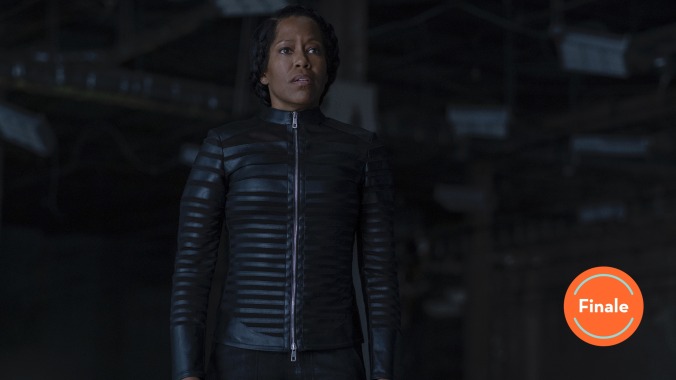Watchmen's finale leaves behind more questions than answers


Now you knew Damon Lindelof wouldn’t allow us to see the birth of the god queen Angela Abar (Regina King). Sorry, I had to get that out in the open before we begin. Okay, what a finale, right? There are even more questions than answers, but the same could be said of Alan Moore and Dave Gibbons’ original graphic novel. Critiquing the sins of the recent past against the most difficult questions of how to proceed in the here and now made Watchmen one of the greatest novels ever written. Honoring that lineage has made the television show one of the best watches of the decade.
The graphic novel used the Tales Of The Black Freighter, the popular pulp rag that followed a marooned pirate on a bloody trail of revenge, to slowly reveal the truth of the giant squid and the pain of each masked hero. Similarly, Veidt’s trial on Jupiter’s moon informed the television audience about the survival mode of each individual in the series. The Game Warden (Tom Mison) became the obsessive, lovesick villain Veidt needed to compete against so he wouldn’t go insane. In the end, Veidt’s still able to perform the trick that made him a legend: the magic bullet catch. But, in becoming what Veidt needed, the Warden became someone he did not recognize. “The mask makes men cruel,” Veidt confesses before tossing aside the Warden’s body like so much trash. Veidt says his goodbye in front of a procession of servants, each one with the same face, but different expression. A man wears many masks in his life, the kaleidoscope of expression warns. What will these innocent and hurting people become now that a second deity has abandoned them?
Trieu turned Veidt into the icon he always wanted to be, before displaying him proudly in her garden. Senator Joe Keene (James Wolk) and Jane Crawford (Frances Fisher), worried their heritage and status in the world would be lowered, tried to make a god in their image to turn the tide. Lady Trieu (Hong Chow) sought to prove she earned her trillionaire status and deserved to be the god who would change the world. Laurie (Jean Smart) needed to protect her broken heart, and Looking Glass (Tim Blake Nelson) needed to feel safe again. Angela, driven by a century or more of trauma that had been handed down through her family line, aimed to protect wherever the long arm of the law came up short.
All these needs hardened into anger—or, those feelings that mask anger. Will Reeves (Louis Gossett Jr.) explains it best to Angela in the theater. “It was fear. Hurt. You can’t heal that with a mask, Angela. Wounds need air.” In a fake church, inside an abandoned warehouse, before a frayed American flag, these hurt parties converge for a lynching. White Kavalry members look on with glee; they’ve waited a long time for this particular form of entertainment. Blinded by greed and hate, seeing a god on his knees assures them of their superiority. There’s something particularly wonderful about Angela explaining to them in detail that the only reason they have their stolen technology is because Trieu wanted them to have it. They believe themselves to be clever, but their plan is half-baked. Keene’s power striptease in front of the congregation of Cyclops superiors works as a showcase of the superiority they feel. Unashamed, unafraid, he even wears the underwear Manhattan wore when he attacked Vietnam. It’s a part of the warlord era of Manhattan. No surprise there.
Jon (Yahya Abdul-Mateen II) transformed himself into Cal over the years he was partnered with Angela. After Veidt dropped the squid and Laurie left him, Cal was free for the first time in his life to make his own decisions. Where last week centered on the dangers of love, “See How They Fly” explores the rewards of love. Cal crafted a beautiful haven that lacked the substance that makes life great: love. In the bar, and over the course of their decade long relationship, Cal poured love into Angela. He gave her the family she secretly longed for, and supported her emotionally. In his quiet life as a stay-at-home dad, Cal could finally be at peace.
Cal’s final moments reflect his development from detached god to family man. Once inside of the battery powered cell, his ability to stay in the present becomes compromised. A river of Keene’s blood allows him to transport Laurie, Veidt, and Looking Glass to Veidt’s Arctic lair to stop Trieu, but he doesn’t send Angela. “I don’t want to die alone,” he explains. Under his pain and humiliation, the moments he clings to are his happiest moments with Angela. His last moments are his most human. When Angela registers this is the end, she watches him be be torn apart by an invisible energy. From this moment until the the end of the episode, Atticus Ross and Trent Reznor exceed any emotional sentimentality they’ve expressed this season.
The finale reveals a new question that’s quietly supported the backbone of the entire first season: who’s responsible for our safety? Will tells Angela that with all Cal’s powers, he could have done more with his time on the planet. There were multiple times in the series where Angela, Jean, and Wade could have stopped pursuing the bad guy, looked the other way, or dropped out of the force entirely. After the White Night, after they learned Judd’s true identity, when they realized the conspiracy went all the way to the top, leaving would have been the smart thing to do. The largest departure the show takes from the comic book comes in the form of true heroes.
Fallible, wounded, and struggling, this older, wiser, and more enlightened group don’t turn to their vices, defy the law, or hide their mistakes. Laurie, who’s struggled with telling the difference between the good guys and the bad, saves Angela by calling the Martian phone booth and warning her about the incoming frozen squid bullets. Gibbons and Moore ended their tale on a mixed note of delight and despair: Laurie makes amends with her mother and runs off with a nice, stable man that loves her. Rorschach begs for his death, unable to live with the pervasive injustice plaguing the world. The world becomes a more diverse and peaceful place, but Veidt murdered 3 million people and walked away as a free man. The artists leave a door open. Rorschach’s journals have fallen in the hands of a right-wing copy editor for one of the country’s largest publications. An actor with very little political experience began to consider a run for the presidency. The heroes avoided disaster, but not laid it to rest. In Lindelof’s world, growth comes in the form of acknowledgment. Ideally, Laurie would get Dan (her Owl boyfriend) out of prison. Wade would be able to process his trauma, and hopefully, Veidt would be prosecuted. Of course, it’s not all sunshine and rainbows. A new weapon of mass destruction entered the field of play. The digital targeting display of the squid drop looked exactly like a bomb. If the world learned of Veidt’s deception, they’d also know and most likely try to recreate his organic weapon.
In a show that ultimately turned out to be about the power of love, Lindelof and his team of writers appear to be asking us to trust in the law. There’s no guarantee Veidt will face justice, but Laurie and Wade trust in it enough to arrest the man, and get the process started. As impeachment proceedings begin, Watchmen finds another surprising way to shine a light on real-world darkness.
This ending holds a lot of catharsis. Art’s ability to heal is superficial, but not unimportant. On this journey, we have seen a country capable of both apologizing to citizens impacted by slavery, and capable of enacting a financial solution to decades of inequality. We saw thriving Black communities with rich artistic centers. Black love saved the world, and a Black woman became a god. (I don’t care that we didn’t get to see it. That’s what happened.) More than that, generational trauma got a nationwide introduction to a large American audience. Physically feeling the pain of your ancestors is a common trait amongst all humans, and yet when we try to describe it, it sounds like a fairy tale. We have not allowed ourselves to properly come to terms with that trauma on a national level. It’s left us angry and hurt, and afraid.
Bian (Jolie Hoang-Rappaport) lost a daughter, a mother, and a certain future. She knew many realities. Her memories were more than her former life in Vietnam. She made new memories in a new country, with a new mother, and a new understanding of reality. This certainly made Bian one of the most interesting characters on the show.
The show’s greatest shortcoming will be the limited exploration of the lives of the colonization and child survivors of war in modern America, particularly as it pertains to Asian Americans. Spending more time with Bian before the death marches, or showing how she experiences a day running the factory would have given us more insight into her perspective. At the end of the episode, the police take Bian into custody. Certainly, these beginnings serve for a great villain origin story. We may never know if Bian would bring Lady Trieu back to life via artificial insemination, cloning, and/or Nostalgia. If the truth of what Veidt did ever got out, the world could dissolve into chaos. Lady Trieu’s mother/daughter wouldn’t have trouble finding allies. Leaving Bian’s story open leaves a thrill of excitement for any future projects.
In a conversation with Marc Bernardin, a former Los Angeles Times film critic, Lindelof said he’s not yet had an idea worthy of continuing the series, but given the landscape of television prestige shows like Big Little Lies and Fargo, nothing about the future of Watchmen is set in stone. Like life, it’s all helter skelter.
Stray observations
- Well, I was the fool for wanting to see Lube Man return on a Lindelof show. I should have known better. In my head canon, he will remain Agent Petey until someone from the show confirms otherwise. I think the appearance of Lube Man and the kids’ greedy relative from episode three helped make the world feel more lived in.
- Speaking of Petey, is he still chilling with seven dead bodies in an underground bunker? Someone go help him, please.
- Now that we’ve left the Golden Age of Television, I had been worried that the next era would be quickly-slapped-together reaction pieces relying on name talent to sell moderately good shows. Fleabag, Killing Eve, and Queen Sugar gave me hope that thoughtful, measured, and meditated pieces could take center stage. Watchmen joins their ranks as a show telling only as much story as need to be told. Shows limited in scope but expansive with reach pack a powerful punch.
- Finally, it has been my absolute pleasure to take this journey with you guys. Your comments, theories, and general messages of joy made an already great show, a wonderful experience. Thank you so much, TV Club.